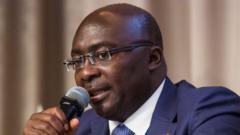Mahamudu Bawumia has emerged as a significant figure in Ghanaian politics, now serving as the Vice-President with aspirations to become the nation's first Muslim president. The 61-year-old, recognized for his digital initiatives, was recently named the candidate for the ruling New Patriotic Party (NPP) in the upcoming general elections. While he garners respect for his academic credentials from Oxford and his commitment to transforming Ghana into a digital hub, his leadership of the economic management team links him to the current economic turmoil, marked by soaring inflation and substantial public debt.
Bawumia's political journey took off in 2008 when, without prior public office experience, he was selected as a running mate by then-presidential candidate Nana Akufo-Addo. Though they faced defeat, his role in invigorating the NPP's campaign drew attention. The duo attempted again in 2012 and faced another loss, but Bawumia’s effective testimony during a Supreme Court election challenge showcased his resilience, further cementing his political standing. It wasn't until 2016 that Bawumia ascended to the vice-presidency after their third electoral attempt succeeded.
Bawumia's roots trace back to Tamale, where he was born to a large family, the twelfth of eighteen children. After excelling in education both in Ghana and the UK (holding a master's degree in economics), he returned to Ghana as deputy governor of the central bank. His unique backstory—balancing studies with jobs as a taxi driver and cleaner—adds to his relatability among voters.
Under his tenure, however, the government has battled escalating economic problems, prompting critics to question his capabilities. The vice-president has defended his administration, stating that his team had advisory roles but lacked decision-making power. Despite this, many Ghanaians remain skeptical, linking his image as an economic technocrat to the sharp decline in living conditions.
In a notable contradiction, while Bawumia is hailed for advancing Ghana's digital landscape—facilitating initiatives like a drone-based vaccine delivery system— critics argue that the digital progress would have occurred without his specific influence. His political initiatives often focus on digitalization rather than addressing pressing economic concerns, leading some to conclude that he is avoiding tougher discussions.
Bawumia's personal life plays a role in his public appeal, prominently featuring his wife, Samira, and their family. As a practicing Muslim, he represents a minority in a predominantly Christian nation, but experts assert that his religious identity is unlikely to hinder his political ambitions. The NPP has rallied behind him, banking on his background to forge deeper connections with northern voters while maintaining a foothold in southern constituencies.
As Bawumia travels the country in his "possibilities bus," passionately articulating a vision for economic recovery, he remains a divisive figure amidst a climate of uncertainty. Though he sees himself as a beacon of hope for Ghana, perceptions of him as a symbol of economic mismanagement linger. “I possess the courage to admit when things aren't going as planned,” he stated, showcasing the resilience that has carried him through nearly a decade of political challenges.



















